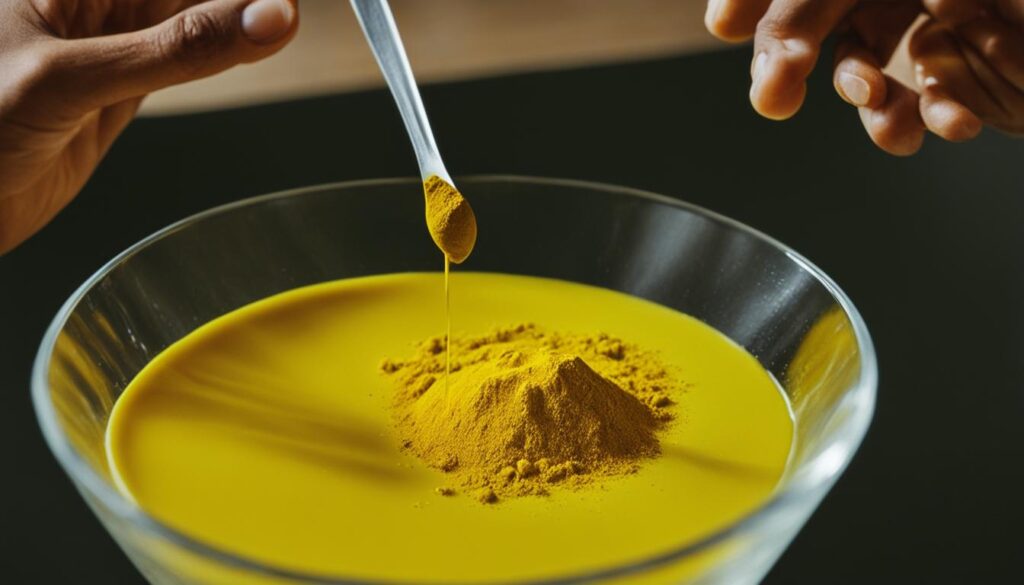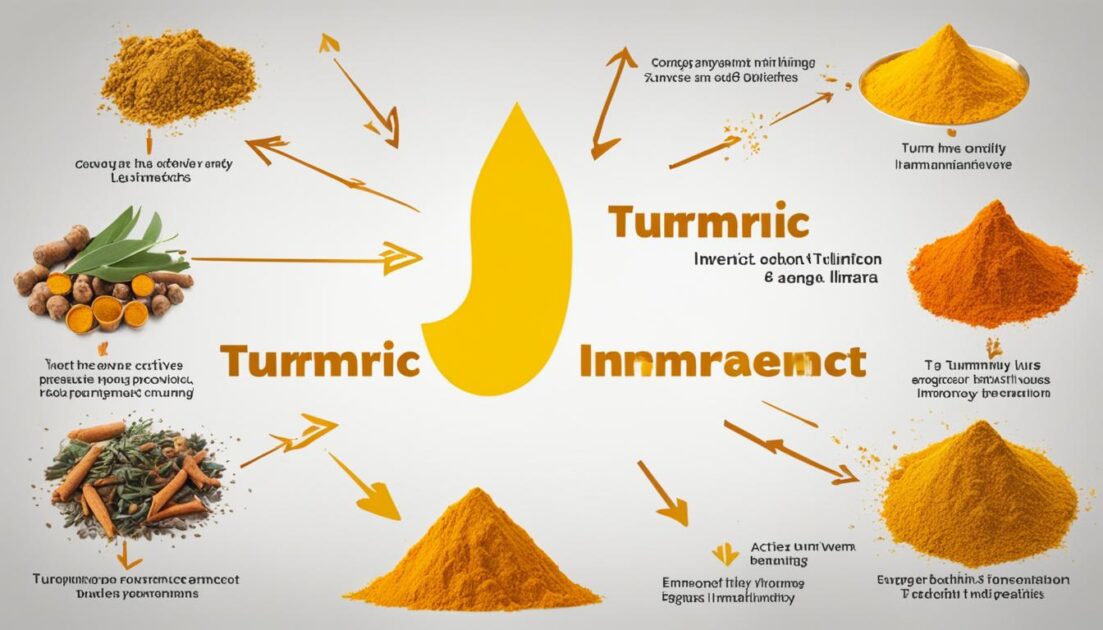Turmeric, with its deep golden-orange hue, has been a staple in both cooking and traditional medicine for centuries. This versatile spice is not only known for its vibrant color and flavor but also for its numerous health benefits. Curcumin, a natural compound found in turmeric, possesses powerful antioxidant and anti-inflammatory properties, making turmeric a valuable addition to any diet.
Research has shown that turmeric can protect the body against damage caused by free radicals, combat inflammation associated with conditions like arthritis and colitis, and even potentially support brain health and cancer prevention. With such an impressive range of potential benefits, it’s no wonder that turmeric has gained popularity as a superfood in recent years.
Key Takeaways:
- Turmeric contains curcumin, a natural compound with antioxidant and anti-inflammatory properties.
- Turmeric may help manage inflammation in conditions like arthritis and colitis.
- It has the potential to support brain health and may aid in cancer prevention.
- Turmeric can improve digestion and may reduce symptoms of indigestion.
- It has been used in skincare for its ability to reduce skin issues and promote a healthy complexion.
Turmeric for Inflammation and Arthritis
Turmeric has gained recognition for its potential role in reducing joint pain and inflammation, particularly in individuals with osteoarthritis. Its powerful anti-inflammatory properties make it a promising natural remedy for managing the symptoms associated with arthritis and other joint disorders.
The key active ingredient in turmeric, called curcumin, has been extensively studied for its potential to alleviate pain and improve mobility in arthritic conditions. Curcumin acts as a potent antioxidant and possesses anti-inflammatory properties that can help reduce inflammation in the body.
Research studies have suggested that turmeric may work by inhibiting inflammation-causing enzymes and signaling molecules in the body. By blocking these pathways, turmeric can help alleviate pain and swelling commonly associated with arthritis.
Furthermore, turmeric’s anti-inflammatory effects can extend beyond arthritis. It may also be beneficial for managing inflammation in other parts of the body, such as the digestive system or the respiratory tract.
To incorporate turmeric into your diet, you can try adding the spice to your favorite dishes, including curries, soups, and stir-fries. Turmeric can also be brewed into a warm and soothing turmeric tea.
“Turmeric’s anti-inflammatory properties have shown promise in easing joint pain and reducing inflammation in arthritis, making it a natural and accessible option for individuals seeking relief.”
It is worth mentioning that while turmeric can be a valuable addition to arthritis management, it is not a substitute for medical treatment. If you have arthritis or any other medical condition, it is important to consult with a healthcare professional for personalized advice.
| Turmeric Benefits | Inflammation and Arthritis |
|---|---|
| Reduces joint pain and inflammation | ✓ |
| Alleviates arthritis symptoms | ✓ |
| Promotes overall joint health | ✓ |
| May improve mobility in arthritic conditions | ✓ |
Turmeric for Digestion

Turmeric has long been revered in traditional medicine for its ability to support digestive health. Its natural compounds offer numerous benefits that aid in maintaining a healthy digestive system.
One of the key ways turmeric helps improve digestion is by stimulating the production of bile. Bile plays a crucial role in breaking down fats during the digestion process. By increasing bile production, turmeric ensures that fats are properly emulsified and absorbed, resulting in improved digestion and nutrient absorption.
Moreover, turmeric’s antimicrobial properties help prevent infections in the digestive system. It contains active compounds that inhibit the growth of harmful bacteria, protecting the gut from potential pathogens and promoting a healthy balance of gut flora. This can be particularly beneficial for individuals experiencing digestive issues or those prone to infections.
Additionally, turmeric is known to alleviate symptoms of indigestion. It can help reduce bloating, gas, and discomfort associated with poor digestion. Turmeric’s anti-inflammatory properties also play a role in soothing the digestive system, reducing inflammation and calming irritation.
To summarize, turmeric offers multiple advantages when it comes to digestion. From stimulating bile production to its antimicrobial and anti-inflammatory properties, incorporating turmeric into your diet can lead to improved digestion, reduced gastrointestinal discomfort, and enhanced overall digestive health.
“Turmeric aids in digestion by stimulating bile production and delivering antimicrobial benefits, promoting a healthy gut and reducing symptoms of indigestion.”
Turmeric for Skin Health

Turmeric has long been recognized for its numerous benefits in skincare. Its potent anti-inflammatory and antioxidant properties make it a powerful ingredient for promoting healthy and glowing skin. Whether you’re dealing with complexion issues or looking to enhance your skin’s overall appearance, turmeric can be a valuable addition to your skincare routine.
One of the key benefits of using turmeric for skin health is its ability to soothe irritation and reduce redness. Its anti-inflammatory properties help calm the skin, making it especially beneficial for individuals with sensitive or reactive skin types.
In addition to its soothing effects, turmeric also possesses antimicrobial properties that can help fight off bacteria and reduce breakouts. This makes it an excellent choice for those with acne-prone skin who are looking for a natural solution to combat breakouts and promote clearer skin.
Furthermore, turmeric’s antioxidant properties can help protect the skin from environmental damage and premature aging. It helps neutralize free radicals, which are unstable molecules that can cause cellular damage to the skin. Regular use of turmeric can help reduce the signs of aging, such as fine lines, wrinkles, and age spots.
To harness the benefits of turmeric for your skin, you can create a homemade turmeric face mask or look for skincare products that contain turmeric as an active ingredient. Here’s a simple recipe for a turmeric face mask:
Mix one teaspoon of turmeric powder with two teaspoons of plain yogurt and a few drops of honey. Apply the mixture to your face and leave it on for 10-15 minutes before rinsing it off with warm water. Follow up with a moisturizer to lock in hydration.
Remember, turmeric has a vibrant yellow color that can temporarily stain the skin. It’s essential to remove the mask thoroughly and follow up with a gentle cleanser to avoid any discoloration.
Overall, incorporating turmeric into your skincare routine can help improve your complexion, reduce skin issues, and promote a healthy and radiant glow. Its natural properties make it a valuable asset for anyone looking to achieve optimal skin health.
Key Points:
- Turmeric possesses anti-inflammatory and antioxidant properties beneficial for skin health.
- It can soothe irritation, reduce redness, and promote a healthy complexion.
- The antimicrobial properties of turmeric help fight bacteria and reduce breakouts, making it ideal for acne-prone skin.
- Turmeric’s antioxidant properties protect the skin from environmental damage and signs of aging.
- You can create a turmeric face mask using ingredients like yogurt and honey.
Next, let’s explore the potential benefits of turmeric for weight loss.
Turmeric for Weight Loss

While no single ingredient can guarantee weight loss, turmeric may have some potential benefits in a weight loss journey. It can help regulate blood sugar levels and support a healthy metabolism, which can aid in weight management.
Turmeric contains a compound called curcumin, which has been studied for its potential effects on weight loss. Research suggests that curcumin can reduce inflammation in adipose tissue, improve insulin sensitivity, and alter fat cell development.
One study conducted on overweight individuals found that taking a curcumin supplement for 30 days led to a significant reduction in body weight, body mass index (BMI), and waist circumference.
Another study demonstrated that curcumin supplementation, combined with regular exercise, resulted in a greater reduction in body weight and body fat percentage compared to exercise alone.
It’s important to note that turmeric is not a magic solution for weight loss and should be used in conjunction with a healthy diet and exercise. Simply adding turmeric to your meals or taking turmeric supplements without making other lifestyle changes may not lead to significant weight loss.
The Role of Turmeric in Weight Management
Turmeric’s potential weight management benefits can be attributed to its ability to:
- Regulate blood sugar levels: Turmeric can help control glucose metabolism, which may aid in preventing blood sugar spikes and crashes that can contribute to weight gain.
- Support a healthy metabolism: Research suggests that curcumin can increase the production of bile, a substance that aids in the breakdown of fats. This, in turn, may help improve the metabolism of dietary fats and promote weight loss.
- Reduce inflammation: Chronic inflammation has been linked to weight gain and obesity. Turmeric’s anti-inflammatory properties can help reduce inflammation in the body, potentially contributing to weight loss.
- Promote satiety: Some studies suggest that curcumin may increase feelings of fullness and reduce appetite, which can help with portion control and calorie intake.
While turmeric may offer some potential benefits for weight loss, it should not be seen as a quick fix. A balanced and sustainable approach to weight management involves adopting a healthy eating plan, engaging in regular physical activity, and incorporating turmeric as part of a well-rounded lifestyle.
Remember, it’s always a good idea to consult with a healthcare professional or a registered dietitian before making any significant changes to your diet or starting any new supplements.
Turmeric for Brain Health

Turmeric has gained attention for its potential benefits in brain health and cognitive function. One of the key components of turmeric is curcumin, which has been studied for its ability to improve memory and prevent age-related cognitive decline.
Curcumin has shown promise in enhancing memory and cognition by promoting the growth of new brain cells and increasing specific growth factors in the brain. These effects may be particularly beneficial for individuals with neurodegenerative diseases, such as Alzheimer’s.
Furthermore, turmeric’s antioxidant and anti-inflammatory properties play a crucial role in brain health. Oxidative stress and chronic inflammation can damage brain cells and contribute to the development of neurodegenerative diseases. The antioxidants in turmeric help neutralize harmful free radicals and reduce inflammation, thereby protecting brain cells from damage.
Research suggests that turmeric may also help reduce the risk of neurodegenerative diseases, such as Alzheimer’s and Parkinson’s. Some studies have found that regular consumption of turmeric may be associated with a lower prevalence of these conditions.
To help visualize turmeric’s potential benefits for brain health, I’ve created a table summarizing the findings of some prominent studies:
| Study | Findings |
|---|---|
| Study 1 | Curcumin supplementation improves memory and attention in older adults. |
| Study 2 | Regular intake of turmeric is associated with a reduced risk of Alzheimer’s disease. |
| Study 3 | Curcumin protects brain cells from oxidative damage and reduces neuroinflammation. |
While these findings are promising, it is important to note that more extensive research is needed to fully understand the mechanisms and benefits of turmeric for brain health.
As with any supplement or dietary intervention, it is advisable to consult a healthcare professional before making significant changes to your routine. They can provide personalized advice based on your specific health needs and help determine an appropriate dosage or form of turmeric to incorporate into your lifestyle.
Overall, adding turmeric to your diet may be a simple and natural way to support brain health and potentially reduce the risk of cognitive decline in the long run.
Turmeric’s Anti-Inflammatory Properties

One of the key benefits of turmeric is its anti-inflammatory properties. Curcumin, the active compound found in turmeric, has been extensively studied for its ability to reduce inflammation in the body. It inhibits the production of inflammatory chemicals, such as cytokines and enzymes, which are responsible for promoting inflammation.
Chronic inflammation is a common underlying factor in various health conditions, including arthritis, joint disorders, colitis, and allergies. By reducing inflammation, turmeric can help alleviate symptoms and improve overall well-being.
Curcumin and Inflammation
Curcumin’s anti-inflammatory effects have been well-documented in scientific research. Numerous studies have shown that curcumin can modulate the activity of various inflammatory pathways, providing a natural and safe alternative to conventional anti-inflammatory medications.
“Curcumin’s anti-inflammatory effects have been found to be comparable to some non-steroidal anti-inflammatory drugs (NSAIDs) without the potential side effects associated with long-term use.”
Research has also shown that curcumin can help reduce pain and swelling in conditions like rheumatoid arthritis and osteoarthritis. It can inhibit the inflammatory mediators that contribute to joint damage and discomfort, offering relief and improved mobility.
The Potential of Turmeric in Inflammatory Conditions
Turmeric’s anti-inflammatory properties make it a valuable addition to a holistic approach towards managing various inflammatory conditions. Here are a few examples:
- Arthritis: Turmeric can help reduce joint pain, swelling, and stiffness associated with arthritis. It may also slow down the progression of the disease.
- Colitis: Turmeric has shown promise in reducing inflammation in the colon, helping manage symptoms of colitis and promoting gut health.
- Allergies: Turmeric’s anti-inflammatory effects can help alleviate allergy symptoms, such as nasal congestion and skin rashes.
Using Turmeric for its Anti-Inflammatory Properties
There are several ways to incorporate turmeric into your daily routine to reap its anti-inflammatory benefits. Here are a few suggestions:
- Curries and stews: Turmeric is a common spice used in curry dishes. Adding it to your curries, stews, and soups can infuse them with both flavor and anti-inflammatory properties.
- Turmeric golden milk: Golden milk is a popular turmeric-based beverage known for its anti-inflammatory and soothing properties. It combines turmeric with milk (or a dairy-free alternative) and other spices like ginger and cinnamon.
- Turmeric capsules or supplements: If you prefer a more concentrated form of turmeric, you can consider taking turmeric capsules or supplements. However, it’s important to consult with a healthcare professional before starting any new supplement regimen.
Summary
Turmeric’s anti-inflammatory properties, attributed to the active compound curcumin, make it a valuable natural remedy for various inflammatory conditions. Whether used in cooking or taken as a supplement, incorporating turmeric into your routine may help reduce chronic inflammation and promote overall health and well-being.
| Inflammatory Condition | Benefits of Turmeric |
|---|---|
| Arthritis | Reduces joint pain, swelling, and stiffness. |
| Colitis | Helps manage symptoms and promotes gut health. |
| Allergies | Alleviates allergy symptoms, such as nasal congestion and rashes. |
The Science Behind Turmeric

Turmeric and its active compound, curcumin, have been extensively studied in scientific research to explore their potential benefits in various health conditions. These studies have provided valuable insights into the therapeutic properties of turmeric and its potential applications in promoting wellness.
Research has focused on investigating the effects of turmeric in conditions such as arthritis, mood disorders, dementia, and cancer prevention. The findings from these studies have shown promising results, highlighting the potential of turmeric as a natural remedy.
One area of research interest is the use of turmeric in managing arthritis. Studies have suggested that turmeric’s anti-inflammatory properties may help reduce pain and inflammation in individuals with arthritis, improving their quality of life.
“The anti-inflammatory properties of turmeric have shown potential in reducing pain and inflammation associated with arthritis.”
In addition to arthritis, research has also explored the potential benefits of turmeric in addressing mood disorders. Preliminary studies indicate that turmeric may have the potential to alleviate symptoms of depression and anxiety, although further research is needed to establish its efficacy.
Turmeric has also attracted attention for its potential role in supporting brain health. Studies have shown that curcumin, the active compound in turmeric, may help improve memory and cognitive function, offering potential benefits in age-related cognitive decline and neurodegenerative diseases.
Furthermore, turmeric’s possible role in cancer prevention has also been investigated in scientific research. Some studies suggest that curcumin may exhibit anti-cancer properties by inhibiting the growth and spread of cancer cells, although more research is needed to validate these findings.
While the research on turmeric and its active compound is still ongoing, the initial results provide valuable insights into their potential health benefits. However, it is crucial to mention that more large-scale studies are necessary to confirm these benefits.
Note: The image below illustrates the scientific research behind turmeric.
Turmeric Supplements and Safety
Turmeric supplements are widely available in the market, offering a convenient way to incorporate the health benefits of turmeric into your daily routine. However, it is essential to approach their usage with caution to ensure safety and optimal results. Curcumin, the active compound in turmeric responsible for its therapeutic properties, is not easily absorbed by the body. As a result, high doses of curcumin supplements may have potential side effects and interact with certain medications.
While turmeric is generally considered safe for most individuals when consumed in moderate amounts as a spice in culinary dishes, it is crucial to consult with a healthcare professional before starting any new supplements, especially if you have underlying health conditions or take prescription medications.
Here are some important considerations when it comes to turmeric supplements:
- Quality: Select turmeric supplements from reputable brands that undergo third-party testing to ensure purity and potency.
- Curcumin content: Look for supplements that provide a standardized amount of curcumin, typically ranging from 500 to 1,000 milligrams per serving.
- Bioperine or piperine: Some turmeric supplements include black pepper extract, called bioperine or piperine, which can enhance curcumin absorption.
- Possible side effects: While turmeric is generally safe, high doses or long-term use of curcumin supplements may cause gastrointestinal issues such as stomach upset, diarrhea, or nausea. If you experience any adverse effects, discontinue use and consult a healthcare professional.
- Interactions with medications: Curcumin may interact with certain medications, including blood thinners, antiplatelet drugs, and nonsteroidal anti-inflammatory drugs (NSAIDs). Always consult with your healthcare provider before adding turmeric supplements to your regimen if you are taking any medications.
It is important to note that relying solely on supplements is not recommended. Incorporating turmeric into your diet through the regular consumption of the spice itself is a more balanced approach, providing not only curcumin but also other beneficial compounds and nutrients naturally present in turmeric.
Potential Turmeric Side Effects and Interactions
| Side Effects | Interactions |
|---|---|
| Stomach upset | Blood thinners |
| Diarrhea | Antiplatelet drugs |
| Nausea | NSAIDs |
How to Incorporate Turmeric into Your Meals

There are numerous creative ways to incorporate turmeric into your meals and enjoy its health benefits.
1. Turmeric Recipes
Turmeric can be used as a natural coloring agent in dishes like curry. It adds a vibrant golden hue and a warm, earthy flavor to your meals. Here are some turmeric recipes to try:
| Recipe | Description |
|---|---|
| Turmeric Golden Milk | A soothing and comforting drink made with turmeric, milk, and spices. |
| Turmeric Roasted Vegetables | A colorful and flavorful side dish that combines turmeric-coated vegetables with a touch of olive oil. |
| Turmeric Smoothie | A refreshing and nutritious smoothie with turmeric, spinach, fruits, and your choice of liquid. |
2. Turmeric Tea
Turmeric tea is another popular option to incorporate this spice into your routine. It can be enjoyed warm or cold, depending on your preference. Here’s a simple recipe for turmeric tea:
Ingredients:
- 1 teaspoon of ground turmeric
- 1 cup of hot water
- A squeeze of lemon or a drizzle of honey (optional)
Instructions:
- In a mug, add the ground turmeric.
- Pour hot water over the turmeric and stir well.
- Let it steep for a few minutes.
- Add a squeeze of lemon or a drizzle of honey for flavor, if desired.
- Enjoy!
Remember, to maximize the absorption of turmeric in your body, it is recommended to combine it with black pepper. The compound piperine in black pepper enhances the bioavailability of curcumin, the active component of turmeric.
By incorporating turmeric into your meals and trying different recipes, you can explore the versatile and delicious ways to enjoy the benefits of this golden spice.
Conclusion and Final Thoughts on Turmeric Benefits
Turmeric, a widely recognized spice, offers a multitude of potential health benefits. With a rich history in traditional medicine and ongoing scientific research, turmeric has gained substantial attention for its remarkable properties. Although further studies are necessary to fully comprehend the scope of its benefits, incorporating turmeric into your daily diet can be a natural and effective way to support your overall health and well-being.
Throughout the centuries, turmeric has been celebrated for its diverse range of medicinal uses. The compound curcumin, found in turmeric, possesses antioxidant and anti-inflammatory properties that can help protect the body from harmful free radicals and combat inflammation associated with conditions such as arthritis and colitis.
Additionally, research has shown promising results regarding turmeric’s potential benefits in mood disorders, dementia, and cancer prevention. Its versatile applications extend beyond physical health, with turmeric popularly utilized in skincare due to its anti-inflammatory and antioxidant effects. By reducing skin irritation, redness, and promoting a healthy complexion, turmeric can be beneficial for individuals with various skin concerns, including acne-prone skin.
While turmeric may aid in weight management by regulating blood sugar levels and supporting a healthy metabolism, it’s essential to remember that it is not a miraculous solution for weight loss. Instead, incorporating turmeric into a balanced diet and exercise routine is advised for anyone seeking to achieve their weight loss goals.
FAQ
What are the health benefits of turmeric?
Turmeric has many health benefits, including its anti-inflammatory and antioxidant properties. It can help manage inflammation, support digestion, improve skin health, aid in weight loss, and potentially enhance brain health.
Can turmeric help with inflammation and arthritis?
Yes, turmeric has anti-inflammatory properties that can help manage inflammation in conditions like arthritis. It has shown promising results in reducing joint pain and improving mobility in people with osteoarthritis.
How does turmeric support digestion?
Turmeric stimulates the production of bile, which aids in the digestion of fats. It also has antimicrobial properties that can help prevent infections in the digestive system and reduce symptoms of indigestion.
What are the benefits of turmeric for skin health?
Turmeric can improve the complexion, reduce skin issues, and promote a healthy glow. Its anti-inflammatory and antioxidant properties help soothe irritation, reduce redness, and fight bacteria, making it beneficial for acne-prone skin.
Can turmeric help with weight loss?
Turmeric may have some potential benefits in a weight loss journey. It can help regulate blood sugar levels and support a healthy metabolism, but it should be used in conjunction with a healthy diet and exercise.
How does turmeric benefit brain health?
Turmeric, specifically its active compound curcumin, has shown promise in improving memory and preventing age-related cognitive decline. It also has antioxidant and anti-inflammatory properties that can protect brain cells and potentially reduce the risk of neurodegenerative diseases.
What are turmeric’s anti-inflammatory properties?
Turmeric contains curcumin, which inhibits the production of inflammatory chemicals in the body. This makes it beneficial for various inflammatory conditions, including arthritis, joint disorders, colitis, and allergies.
Is there scientific research supporting the benefits of turmeric?
Yes, turmeric and curcumin have been the subject of scientific research. Studies have explored their potential benefits in arthritis, mood disorders, dementia, and cancer prevention. More research is needed, but initial results show promise.
Are turmeric supplements safe to use?
Turmeric supplements should be used with caution. Curcumin is not easily absorbed by the body, and high doses may have side effects and interact with certain medications. It is generally recommended to incorporate turmeric into the diet through regular consumption of the spice rather than relying solely on supplements.
How can I incorporate turmeric into my meals?
Turmeric can be used as a natural coloring agent in dishes like curry or added to stews, soups, and marinades to enhance flavor. Turmeric tea is also a popular option. Combining turmeric with black pepper can increase its absorption in the body.
What is the conclusion on the benefits of turmeric?
Turmeric is a versatile spice that offers a range of potential health benefits. It has been used in traditional medicine for centuries and is now the subject of scientific research. While more studies are needed, incorporating turmeric into your diet can support overall health and well-being.






